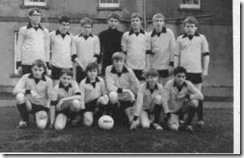Two significant things have been learned in the past week. One was that the Church of Ireland Pension Fund has recovered to the point where it would be possible to retire before the normal retirement age of 68 and take a reduced pension. The second is that the normal age for being considered ‘old’ is 65.
The Irish state pension becomes available for me in October next year at the age of 66 (it brings with it free public transport, a real boon), so with the reduced church pension and the state pension I could retire in eighteen months’ time.
Retirement was something to which my former wife and I had looked forward. It was going to bring opportunities to avoid the grey and wet Irish weather by wintering in the French midi.
Of course, that aspiration disappeared with everything else in my life, but more recently I had wondered about the possibility of a final chapter different from those that had gone before.
I have been working on my French every day and even identified a town in which I would like to live. Orthez seems ideal. I could rent an apartment, be able to pay my bills, and pass my time in a place of history and beauty. A train ride from Bayonne, to which I would travel for rugby, it is convenient to Biarritz airport to which one might fly from Dublin.
The bubble was burst by my son as we sat eating our tea in a Dublin pub yesterday. I was enjoying my Guinness beef stew when he said, ‘but Dad, what would you do all day?’
It was a reasonable question: what would I do?
I always defined myself by what I did, like the members of the Somerset farming family from which I came, doing nothing never seemed a very attractive option.
I have no hobbies. I have always worked as many hours as possible.
Apart from my son, I have no family members whom I would regularly see (I have a two year old grandson whom I have never seen, my daughter considering me unworthy of any contact whatsoever).
Orthez is a beautiful place, but how would I pass my time there?
Certainly, by October 2026, I would officially be old, and living in south-west France, I would definitely be lonely.
My uncles on the home farm in Pibsbury outide of Langport are 78 and 80. When they stop altogether, I shall consider the age they have reached as an appropriate age for retirement.


